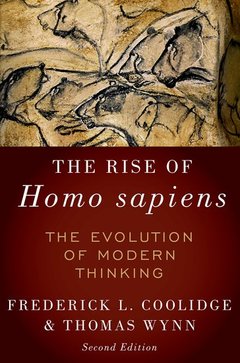Description
The Rise of Homo Sapiens: The Evolution of Modern Thinking (2nd Ed.)
Authors: Coolidge Frederick L., Wynn Thomas
Language: English
Subject for The Rise of Homo Sapiens: The Evolution of Modern Thinking:
71.35 €
In Print (Delivery period: 21 days).
Add to cart
Publication date: 02-2018
344 p. · 15.6x23.5 cm · Paperback
344 p. · 15.6x23.5 cm · Paperback
Description
/li>Biography
/li>
The Rise of Homo sapiens provides an unrivalled interdisciplinary introduction to the subject of hominin cognitive evolution that is appropriate for general audiences and students in psychology, archaeology, and anthropology. The book includes chapters on neural anatomy, working memory, evolutionary methods, and non-human primate cognition, but the bulk of the text reviews major developments in cognition over the span of hominin evolution from the ape-like cognition of Ardipithecus to the final developments that enabled the modern mind. The most provocative chapters of the first edition - the explicit discussion of the role of sleep in hominin evolution and the difference between Neandertal and modern human cognition - incorporate significant developments in both areas since the publication of the first edition. This revised edition updates the former text and adds greater emphasis to the growing fields of epigenetic inheritance, embodied cognition, and neuroaesthetics. The new edition provides greater emphasis on role and status of Homo heidelbergensis.
Thomas Wynn, PhD, is Distinguished Professor of Anthropology at the University of Colorado, Colorado Springs. He has published extensively in Palaeolithic archaeology, with a particular emphasis on cognitive evolution. Frederick L. Coolidge, PhD, is Professor of Psychology at the University of Colorado, Colorado Springs. He focuses primarily on behavioral genetics, paleopsychology, and personality disorders across the lifespan. Both editors are well-known in paleoanthropology as advocates of the enhanced working memory hypothesis for recent cognitive evolution. In 2012, they co-founded the UCCS Center for Cognitive Archaeology. They have also published numerous articles and books together, including How To Think Like a Neandertal (OUP 2012) and Cognitive Models in Palaeolithic Archaeology (OUP 2016).
© 2024 LAVOISIER S.A.S.




